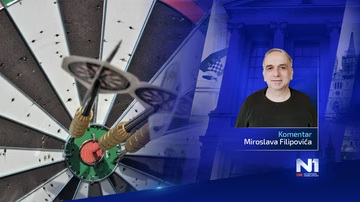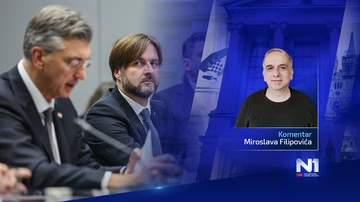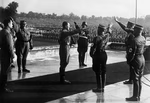
Political analysts predict that the overwhelming election victory of Croatian President Zoran Milanovic will increase tensions with the government of Prime Minister Andrej Plenkovic.
While Milanovic achieved an unprecedented lead in the election, the defeat of HDZ party's candidate Dragan Primorac was widely attributed to his lack of authenticity and inability to mobilise voters.
President Milanovic secured a decisive second term with 74.68% of the vote, defeating his opponent, HDZ-backed Dragan Primorac, by an unprecedented margin of around 49 percentage points.
An unprecedented victory
Viseslav Raos emphasises the exceptional nature of Milanovic’s victory, noting that it is the largest percentage margin in the history of Croatian presidential election.
"Primorac had perhaps hoped to repeat the 2005 election result of former HDZ candidate Jadranka Kosor, who lost to Stipe Mesic, who received almost 66% of the vote in his second term. Primorac, however, did not even reach that mark, which makes Milanovic the strongest result ever," Raos said. He added that even the first president of Croatia, Franjo Tudjman, never achieved such a margin.
Gjenero: Paradoxically, Plenkovic’s victory over Milanovic in the parliamentary election now seems smaller in comparison
Dragan Bagic points out the significance of the fact that Milanovic received more absolute votes than five years ago, a rare event in Croatian politics. "He has not only retained his supporters, but also gained the trust of new voters," he said.
However, Davor Gjenero interprets the result more cautiously and believes that while the percentage lead is large, the absolute figures remain modest. "Milanovic received more votes than Kolinda Grabar-Kitarovic in 2014, but fewer than Ivo Josipovic in 2009," he said.
Gjenero rejected the claim that Milanovic had won an overwhelming mandate: "The rhetoric that Milanovic is an almost plebiscitary president with strong electoral legitimacy is simply not valid."
Future relations with Plenkovic
Bagic believes that Prime Minister Andrej Plenkovic must now decide whether he wants to work with Milanovic on constitutional issues.
Raos, however, believes that Milanovic has little incentive to co-operate. "With his overwhelming public support, Milanovic can claim that the voters approve of his style, his approach and his attitude towards the government."
Bagic: The key factor for Primorac's overwhelming loss is the big difference in the authenticity of the two candidates
As this is his last term in office, Milanovic is not under pressure to seek re-election and can act with great autonomy, Raos added, predicting disputes over defence laws and the appointment of ambassadors.
Gjenero stressed that it was unlikely that Milanovic would ally with the opposition, especially the SDP party, but that he would instead focus on destabilising Plenkovic’s position. He speculated that Milanovic’s actions could put pressure on the HDZ to move away from its pro-European moderate faction.
Why Primorac failed
Bagic attributed Primorac’s failure to his inability to mobilise voters outside the HDZ core base. "The key factor for this overwhelming loss is the big difference in the authenticity of the two candidates," he said.
Raos described Primorac’s defeat as a debacle, noting that his non-party status and his earlier expulsion from the HDZ had probably alienated some party loyalists. He also pointed to the low turnout in HDZ strongholds such as Split-Dalmatia County and Zagreb, where there was an unusually high number of invalid ballots.
In the meantime, Milanovic has managed to attract centre-right and right-wing voters through his confident policies during his first term, Raos added.
Implications for the HDZ
Gjenero warned that the HDZ leadership now faces major political challenges. "The poor choice of candidate has led the HDZ into a serious political retreat," he said.
Raos: Milanovic has managed to attract centre-right and right-wing voters through his confident policies during his first term
He described the defeat as "humiliating" and noted that the HDZ had failed to persuade its voter base to participate in the election. “Paradoxically, Plenkovic’s victory over Milanovic in the parliamentary election now seems smaller in comparison.”
Gjenero concluded that Milanovic’s strong performance could destabilise Croatian European and regional politics, as he continues to advocate a form of pseudo-sovereignty.
Kakvo je tvoje mišljenje o ovome?
Pridruži se raspravi ili pročitaj komentare



 Srbija
Srbija
 Bosna i Hercegovina
Bosna i Hercegovina
 Slovenija
Slovenija



























































